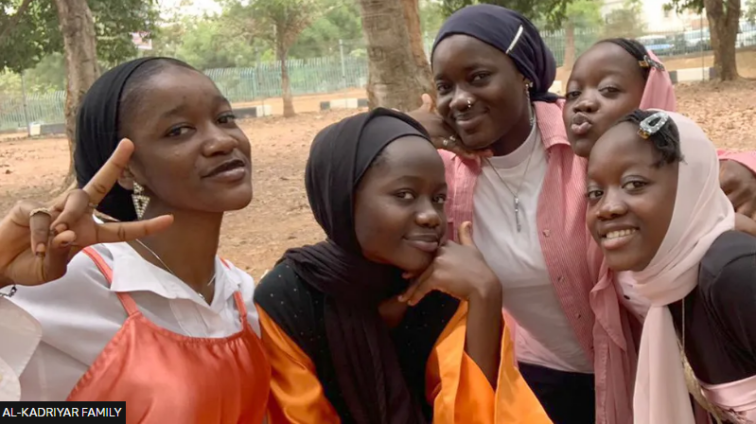Nigerian police say they have successfully rescued five sisters who were held hostage after being kidnapped in the country's capital.
The girls were freed in a joint police-army operation in a forest in northern Nigeria on Saturday night.
They were taken from their home in Abuja earlier this month, along with another sister who was later killed.
The kidnappers had demanded a ransom for their release, but the statement made no mention of one being paid.
Nigerian police said the girls had been reunited with their family following the operation, which took place near the Kajuru forest in Kaduna State at around 23:30 local time (22:30 GMT) on Saturday.
The six sisters, aged from the early teens to 23, were taken hostage alongside their father, Mansoor Al-Kadriyar, on 2 January at the family home in Bwari, a suburb of Abuja.
Witnesses said the girls' uncle ran to find help but was ambushed and killed, as were three police officers.
The kidnappers released Mansoor on the condition he raise a large ransom, but his 21-year-old daughter, Nabeeha, a final year university student, was then killed as a warning, according to a family member who spoke to the BBC on condition of anonymity.
Kidnapping has become rife in Nigeria, with hundreds of people abducted in recent years, largely by criminal gangs who see it as an easy way to make money. It has been particularly bad in the north-west of the country.
The case of the Al-Kadriyar sisters prompted widespread anger in the country, with many arguing that the kidnapping emergency has continued despite government promises to bring it to an end.
First Lady Remi Tinubu urged security agencies to "intensify their efforts" to end the kidnapping and security crisis, and demanded a "swift return of the Al-Kadriyar sisters".
The ransom for the girls' return was set at 65m naira ($68,000; £53,000), leading to many Nigerians donating to a crowdfunding initiative.
However, Defence Minister Mohammed Badaru Abubakar urged people not to contribute towards the ransom, saying it would "only worse the situation".
"We believe we have to stop - as painful as it is. We have to stop responding to payment on ransom. If we stop, over time the kidnapping will not be profitable and they will stop," he said.
No matter how desperate the circumstances, Nigerian law prohibits the payment of ransom money. However, many victims pay up because they do not trust authorities to secure the release of their loved ones.
There has now been an outcry that the insecurity has reached the capital, prompting Abuja's police force to launch a special squad to tackle the kidnapping gangs.
Mr Abubakar said he believed operations against the gangs elsewhere had forced them to move to areas near the capital.
"The security agencies are working very hard to push them out and block the movements and finish them off once and for all," he said.
Latest Stories
-
Cucumbers – Making the most of them
5 hours -
Revenue growth to slowdown to GH¢209.3bn in 2025; T-bills will not be restructured – IC Research
6 hours -
Deloitte celebrates end-of-year Thanksgiving Service
7 hours -
Inflation to end 2025 between 10% and 12% – Databank Research
7 hours -
Government’s commitment to fiscal consolidation to remain strong in 2025
7 hours -
ImageBureau, April Communications take theatre to Nsawam Prisons
7 hours -
Bird flu kills 20 big cats at US animal sanctuary
8 hours -
Your peaceful conduct saved the country from tension – Clergymen commend Bawumia
8 hours -
A Nite of 1031 Laughs & Music to provide emergency insurance for patrons
8 hours -
Body found in wheel well of United plane after landing in Hawaii
8 hours -
Ghana Armed Forces dismisses viral audio alleging ammunition transfer
8 hours -
Former Hohoe MP Bernice Adiku Heloo passes on
10 hours -
CODEO calls for re-run of Ablekuma North, Dome Kwabenya parliamentary elections
10 hours -
4,155 cholera cases with 35 deaths recorded by December 23 – GHS
10 hours -
Mothers celebrate arrival of Christmas Day babies at Ridge Hospital
13 hours

